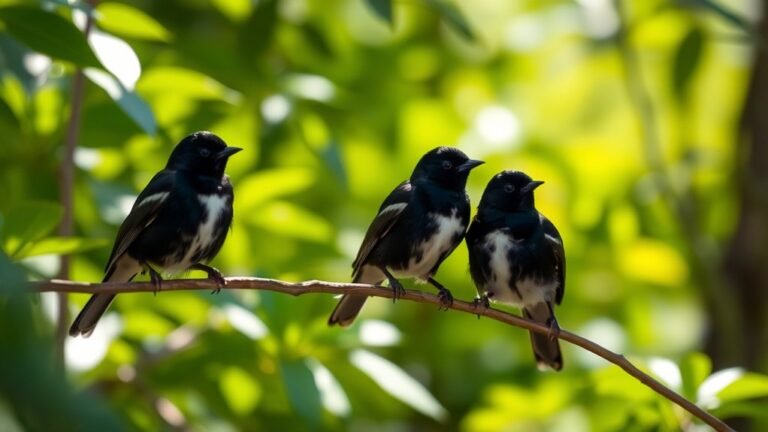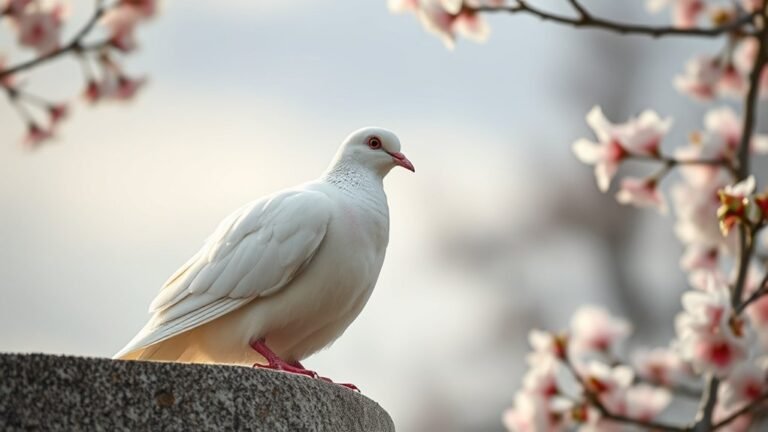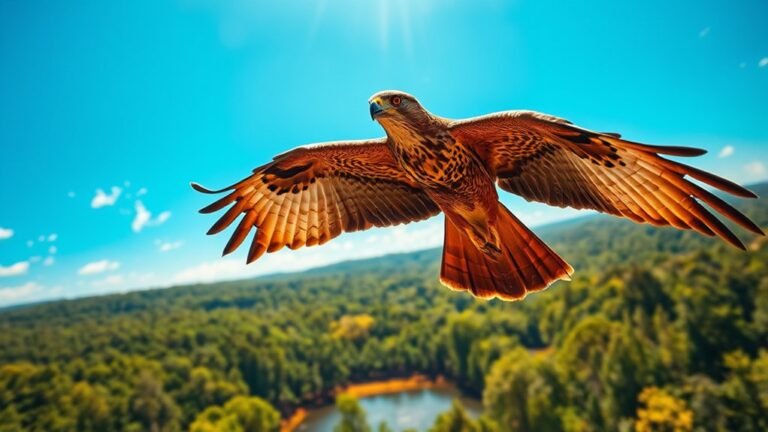Goose Vs Duck: Understanding the Differences
Geese and ducks are both interesting waterfowl, but they have many differences. First, let's look at how they look. Geese are usually bigger than ducks, and they have longer necks. Ducks are smaller and have rounder bodies. They also make different sounds. Geese honk, while ducks quack.
Another key difference is their migration. Many geese fly long distances to find warmer places in the winter. Ducks may migrate too, but some stay in the same area all year round.
When it comes to having babies, geese often mate for life and take care of their young together. Ducks might change partners each season and sometimes don't stay close to their chicks.
Both birds interact with humans in different ways. Some people feed ducks in parks, but geese can sometimes be more aggressive. This difference can affect how we think about protecting these birds.
Understanding these differences helps us see how geese and ducks fit into our world. They have important roles in nature, and knowing about them can help us take better care of our environment.
A Quick Overview
Geese and ducks are two types of birds that people often confuse. Here's how they are different:
- Size and Shape: Geese are bigger with long necks and thick bodies. Ducks are smaller and rounder. Ducks swim easily in water.
- Colors and Sounds: Geese usually have dull colors and they honk. Ducks are bright and make quacking sounds.
- Lifespan: Geese can live over 30 years in captivity. Ducks usually live about 5 to 10 years in the wild.
- Beak Shape: Geese have wide and flat bills, which help them graze on grass. Ducks have narrower bills to scoop food from water.
- Protection and Habitats: Human changes to the environment can hurt both geese and ducks. It's important for people to be aware and help protect these birds and their homes.
Understanding these differences can help you appreciate both geese and ducks!
Taxonomy and Classification
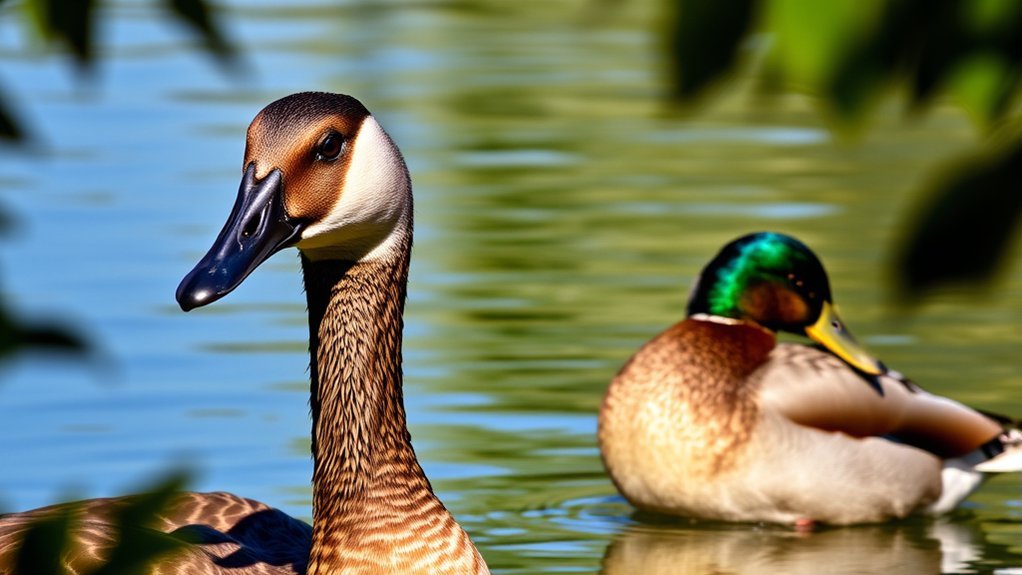
Geese and ducks both belong to the same family called Anatidae. However, they've some important differences. Geese usually have longer necks and thicker bodies. This helps them eat grass and other plants on land.
Ducks, on the other hand, have shorter necks and slimmer bodies. This makes it easier for them to swim, dive, and search for food in the water.
Geese and ducks also behave differently when it comes to raising their young. They share a common ancestor, but over time, they've adapted in unique ways. This has shaped their breeding habits and how they socialize with each other.
Physical Characteristics

Geese and ducks are both in the same family, but they look different. Geese have longer, thinner bodies, while ducks are more rounded and stocky. This shape helps them move around in their homes easily.
Another difference is in their bills. Geese have wider, flatter bills that help them eat grass and plants. Ducks have narrower bills that are better for skimming food from water.
These features show how each bird is made for its own way of living. By looking at these traits, we can see how geese and ducks are specially adapted to their environments. This makes it easier for us to connect with these interesting birds.
Size Comparison
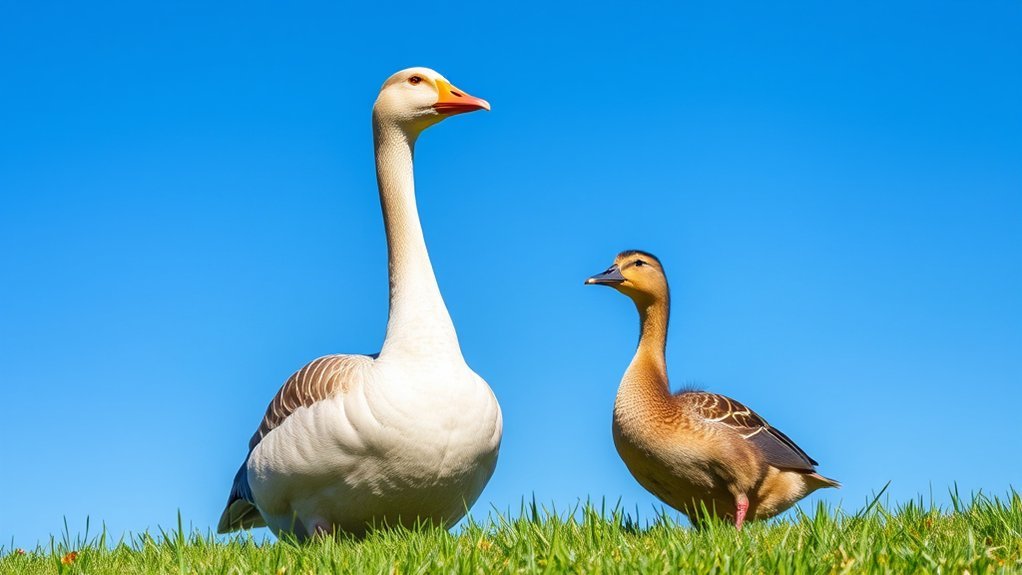
Geese and ducks come in different sizes, and this difference is easy to see. Geese are usually much taller than ducks. On average, geese can be about 26 to 48 inches tall. Ducks are smaller, usually measuring between 16 to 30 inches.
The weight of these birds also varies. Geese typically weigh from 5 to 14 pounds, while ducks weigh about 2 to 6 pounds.
This size difference affects how they eat and where they live. Since geese are larger, they need bigger spaces to live. Ducks, being smaller, can adapt to many types of environments.
Understanding these size differences helps us appreciate how each bird has adjusted to its life.
Feathering and Coloration
Feathering and coloring in geese and ducks show how they adapt to their homes and behaviors. By looking at these features, you can see how these birds survive.
Here are three important differences:
- Color Patterns: Ducks are often bright and colorful. Their colors help attract partners. Geese usually have duller colors. These colors help them blend in with their surroundings.
- Feather Types: Geese have thick and warm feathers. This makes them great for cold weather. Ducks have lighter feathers that keep them dry. This helps them move easily on water.
- Seasonal Changes: Many ducks change colors with the seasons. This makes them more visible during mating season. Geese, however, keep the same colors all year long.
Knowing these differences helps you appreciate these interesting birds even more!
Vocalizations and Communication
Geese and ducks make different sounds to communicate. Geese mostly honk loudly. They use these honks to warn each other, claim their space, or invite others to join them.
On the other hand, ducks make many types of quacking sounds. Each quack has a special meaning, like attracting a partner or signaling danger.
You may notice that geese are louder when they're in big groups. They like to talk a lot with their friends.
Ducks, however, often keep their voices down when they're looking for food.
Learning about how these birds talk helps us understand their social lives better. Both geese and ducks have fun and interesting ways to communicate with each other.
Behavior and Social Structure
When you watch geese and ducks, you'll see that they've different ways of living and interacting with each other. Geese usually stick closely together and work as a team. Ducks tend to be more independent and do their own thing.
Here are three big differences in how they organize themselves:
- Leadership: Geese have a clear leader. This leader helps the whole group stay together. Ducks, on the other hand, don't often have a single leader. They work more like equals.
- Aggression: Geese can be more aggressive. They protect their space and know who's in charge. Ducks are usually calmer and get along better.
- Bonding: Geese have strong family ties. They often travel together in groups. Ducks, however, tend to focus more on making their own personal connections rather than sticking with a group.
Feeding Habits
Geese and ducks have different eating habits. Geese mostly eat grasses, grains, and water plants. They like to pull up plants from the ground and often feed together in groups. This makes for a fun social scene around their favorite snacks.
Ducks, on the other hand, eat a variety of foods. They enjoy seeds, insects, and small fish. Ducks use two main ways to find food: dabbling and diving. This helps them reach lots of different types of food.
When you watch these birds, pay attention to how they find their meals. Their eating habits show how well they can adapt to different places. By noticing what they eat and how they eat it, you can feel more connected to these amazing waterfowl and understand their role in nature better.
Habitat Preferences
Geese and ducks live in wetlands, but they've different likes when it comes to where they stay. Let's take a look at these differences.
- Geese like open fields that are close to water. This helps them find food and watch out for danger.
- Ducks, on the other hand, prefer to nest in thick plants or reeds. These spots keep them and their ducklings safer.
- Geese often return to the same nesting places every year. Ducks might move to different spots based on the season and what's available.
Knowing these differences can help you appreciate how geese and ducks adapt to their homes. They're fascinating birds!
Migration Patterns
As the weather gets colder in the fall, geese and ducks start their amazing trips to find warmer places and more food. Changes in daylight and temperature tell these birds it's time to move.
Geese usually follow specific routes. They look for well-known landmarks like rivers and valleys. Ducks, on the other hand, may choose different paths based on the land around them. Watching how they travel shows us how they listen to nature and their instincts to find safer homes.
Both geese and ducks often travel in family groups or flocks. They stick together as they migrate. Learning about how these birds move helps us see how their lives connect with the places they travel through.
Reproductive Differences
When looking at how geese and ducks reproduce, we can see several clear differences in their mating and nesting habits.
Both birds have their unique ways to ensure they thrive in their environments. Here are three simple differences:
1. Mating Rituals: Geese perform fancy courtship dances. They often move their heads in sync to attract a mate.
Ducks, on the other hand, usually bond in a more casual way without all the fuss.
2. Nesting Sites: Geese like to build their nests close to water where there are plants. This keeps their eggs safe from danger.
Ducks are less picky; they can nest in lots of different places like grassy fields or among reeds.
3. Egg Incubation: Goose eggs take longer to hatch. Both parents usually help sit on the eggs to keep them warm.
Duck eggs hatch faster, and the ducklings are ready to be independent sooner.
These differences show how geese and ducks adapt to their surroundings and keep their families safe.
Lifespan and Longevity
Geese and ducks are interesting birds, and their lifespans are different. Geese usually live longer than ducks. In the wild, geese can live between 10 to 25 years. Ducks, on the other hand, typically live around 5 to 10 years.
When kept in captivity, both birds can live much longer. Ducks can often live up to 15 years or more. Meanwhile, geese can live more than 30 years. This is because they get good care and proper food in a safe environment.
Many things can affect how long geese and ducks live. Their diets, living conditions, and genetics all play a role.
These factors impact their overall health and happiness too. Learning about these differences helps us appreciate both geese and ducks even more!
Human Interaction and Conservation
Humans can greatly affect the lives of geese and ducks. The way we interact with them can change their homes and numbers. Knowing how this works can help us protect these birds better.
- Restore Habitats: Help by supporting projects that bring back wetlands and natural spaces. These areas are good for both geese and ducks.
- Raise Public Awareness: Talk to your friends and family about the importance of wildlife. When we all care, we can do more to protect them.
- Support Laws: Push for rules that keep migratory routes safe. This helps ensure that both geese and ducks can thrive.
Your actions count. When you participate in these conservation efforts, you help keep these birds safe and support the rich variety of life we all share.
Frequently Asked Questions
Can Geese and Ducks Interbreed Successfully?
Can geese and ducks have babies together? Generally, they don't because they act differently when they mate. However, sometimes, they can produce hybrid babies, but this is rare. This shows us the interesting ways birds connect and share traits, even if they are different.
Do Geese or Ducks Have Better Parenting Skills?
When we look at how geese and ducks raise their young, we see some clear differences. Geese are usually more protective and like to work together as a team. They stay close to their goslings and help them stay safe. Ducks, on the other hand, let their ducklings be more independent. They show them how to find food and swim, but then give them space to explore.
These different ways of parenting help their young survive and grow up strong. Geese's teamwork keeps their babies safe, while ducks teach theirs to be self-sufficient. Watching how they care for their young can be really interesting!
Which Is More Aggressive, a Goose or a Duck?
Geese are often more aggressive than ducks. They defend their homes and spaces very strongly. When a goose feels its territory is threatened, it can become quite confrontational. Ducks usually don't show as much aggression. They are generally more peaceful and friendly. So, if you see a goose, it's best to keep your distance, as they can be quite bold in protecting their area.
Are Geese or Ducks More Likely to Be Domesticated?
Ducks are usually easier to domesticate than geese. Ducks show calm behavior and tend to be friendly. This makes them better pets for home environments. People can easily bond with ducks. They often enjoy being around humans. Geese, on the other hand, are less tame and can be more aggressive. This can make them harder to raise and train. Overall, if you want a pet bird, ducks are a great choice!
How Do You Distinguish a Goose From a Duck in the Wild?
To tell a goose from a duck in the wild, look closely at their bodies. Geese are usually bigger and have long necks, while ducks are smaller and have shorter necks.
You can also listen to their sounds. Geese make a honking noise, and ducks quack. This difference in noise can help you decide which bird you see.

Luna is the passionate founder and author of Birds and You, a website dedicated to sharing her love for birds with fellow enthusiasts. Through her engaging articles and guides, she aims to educate and inspire others to explore the fascinating world of birds. When she’s not writing, you can find Luna observing birds in their natural habitats or sharing beautiful bird photography on Pinterest. Join her on this journey to celebrate and protect our feathered friends!


